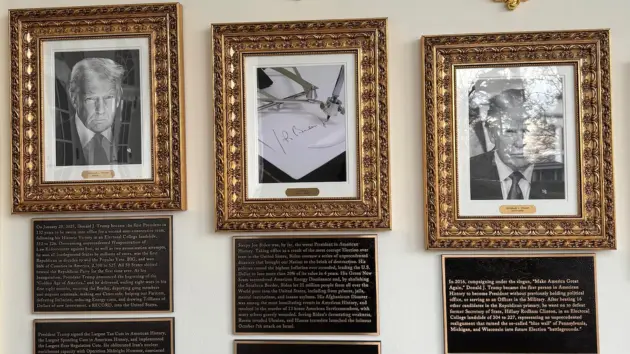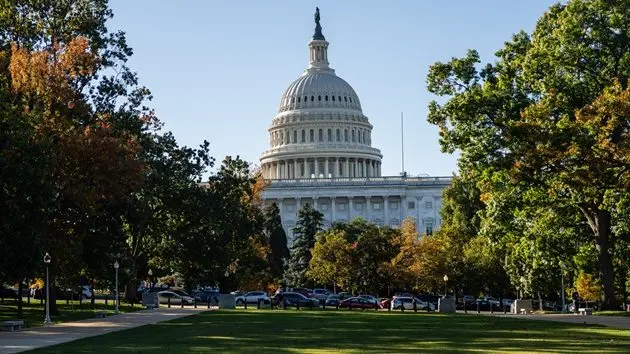(WASHINGTON) — President Donald Trump, a little more than 100 days after taking the oath of office, questioned whether he had a duty to uphold the Constitution and the Fifth Amendment right to due process as he expressed frustration on judicial pushback to his mass deportation effort.
During a wide-ranging interview with NBC News “Meet the Press” moderator Kristen Welker, Trump was asked if he agreed with Secretary of State Marco Rubio that citizens and noncitizens alike are entitled to due process.
“I don’t know,” Trump responded. “I’m not a lawyer. I don’t know.”
Welker noted that the Fifth Amendment, which states in part that “no person” shall be “deprived of life, liberty, or property, without due process of law,” says as much.
“I don’t know,” Trump repeated. “It seems it might say that, but if you’re talking about that, then we’d have to have a million or 2 million or 3 million trials. We have thousands of people that are some murders and some drug dealers and some of the worst people on earth, some of the worst most dangerous people on earth, and I was elected to get them the hell out of here and the courts are holding me from doing it.”
Asked a final time if, as president, he needed to uphold the Constitution, Trump again deflected.
“I don’t know. I have to respond by saying, again, I have brilliant lawyers that work for me, and they are obviously going to follow what the Supreme Court said,” in what’s become a new standard answer in interviews when confronted with similar questions about what the law requires him to do.
Legal experts told ABC News that the Fifth Amendment does not make any distinction between citizens and noncitizens. The Supreme Court has held that illegal immigrants are afforded due process rights under the Fifth and Fourteenth Amendments.
“Even Justice Scalia, for whom President Trump has expressed great admiration, acknowledged that the plain language of the Fifth Amendment clearly provides every ‘person,’ not just American citizens, are entitled to the protections of due process,” Michael Gerhardt, a constitutional law expert at the University of North Carolina, told ABC News.
Scalia’s 1993 ruling in which he wrote it was well established that the Fifth Amendment entitles aliens to due process of law in deportation proceedings” was referenced in a recent Supreme Court order mandating detained migrants be given “reasonable time” to challenge their removal.
“President Trump’s failure to acknowledge that he swore an oath to support and defend the Constitution is unprecedented in American history,” Gerhardt said. “Most presidents have not been lawyers, but every president, other than Trump, has acknowledged that every federal official, including the president, has the duty to uphold the Constitution.”
Trump, with his right hand raised, took the oath of office on Jan. 20 as prescribed by Article II, Section 1 of the Constitution.
“I Donald John Trump do solemnly swear that I will faithfully execute the Office of President of the United States, and will to the best of my ability, preserve, protect and defend the Constitution of the United States,” Trump said during his inauguration.
In another escalation of his standoff with the courts, Trump later on Sunday told reporters that he would seek to appoint judges who won’t challenge his deportation plan.
“I mean, we need judges that are not going to be demanding trials for every single illegal immigrant,” Trump said while taking questions on Air Force One. “We have millions of people that have come in here illegally, and we can’t have a trial for every single person. That would be millions of trials.”
Immigration matters are routinely dealt with in a limited hearing or other court proceedings before an immigration judge, not a full-blown trial as Trump suggests, experts say. Those administrative judges are employees of the Department of Justice.
“It’s a minimal due process hearing, but it does provide due process,” said David Leopold, an attorney and former president of the American Immigration Lawyers Association.
Trump’s comments on Sunday were quickly criticized by Democrats and other critics, who pointed to it as what they said was another example of Trump’s disregard for constitutional boundaries.
“This is as un-American as it gets,” Senate Democratic Leader Chuck Schumer wrote on X.
Republican Sen. Rand Paul also pushed back that “following the Constitution is not a suggestion.”
“It is a guiding force for all of us who work on behalf of the American people. Do you agree?” Paul wrote on X.
“It is shocking that a sitting president would treat the Constitution as if it’s an inconvenience,” said Leopold.
“We can’t just assume that the government is judge, jury and executioner,” said Leopold. “That’s not what this country was founded on. That’s what an authoritarian country is. We are not an authoritarian country. We are a constitutional republic.”
Copyright © 2025, ABC Audio. All rights reserved.





